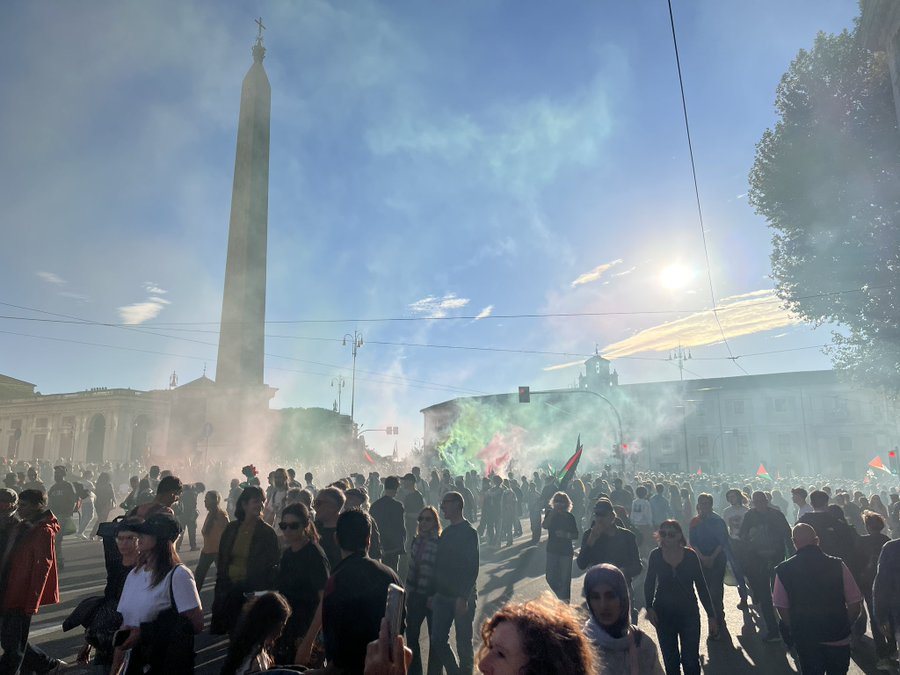Donatella Della Porta sulle grandi mobilitazioni per Gaza da Il Fatto Quotidiano

(Come leggere le enormi mobilitazioni delle ultime settimane? In un’intervista con il Fatto Quotidiano, la direttrice di Cosmos, Donatella Della Porta, analizza il percorso delle mobilitazioni)
Ci sono voluti due anni e una notte per riempire le strade d’Italia di manifestazioni senza precedenti. Per di più su un tema fisicamente lontano, le bombe su Gaza. Nei due anni di bombardamenti israeliani sulla Striscia si sono tesi i fili fra tanti soggetti che dal basso hanno fatto rete sulla causa palestinese. La notte è quella fra il 2 e il 3 ottobre, quando la Marina israeliana ha iniziato ad abbordare e bloccare le navi della Global Sumud Flotilla in rotta verso Gaza. “La Flotilla è stata vissuta come una cosa bella e ‘nostra’ anche da persone non di sinistra, non politicizzate, mai scese in piazza”, spiega Donatella Della Porta, fra le massime studiose dei movimenti sociali in Italia e non solo, docente di Scienze politiche e direttrice del Centre on Social Movement Studies della Scuola normale superiore di Firenze. Sul tema di Gaza ha scritto fra l’altro Guerra all’antisemitismo?, pubblicato da Altreconomia. Dopo le imponenti manifestazioni di venerdì 3 ottobre, Della Porta ha commentato sui social che l’attacco alla Flotilla è stato il “grilletto” che ha fatto esplodere tutte insieme le energie accumulate in questi due anni di “atti di resistenza e di disobbedienza”.
Che impressione le fa questa massiccia mobilitazione per Gaza, dopo anni di discussioni sulle “piazze vuote”, almeno in Italia?
È dall’ottobre 2023 che osserviamo una crescita della mobilitazione. Nelle grandi città e in provincia, persino nei centri turistici. Nelle università, negli ospedali, nel mondo del lavoro, nei porti. Fin dall’inizio, per esempio, i sindacati di base sono riusciti a portare in piazza i lavoratori di origine araba, che trovavano un nesso tra lo sfruttamento lavorativo e il rifiuto della loro identità. Nella primavera dell’anno scorso la protesta degli studenti accampati nelle università si è intrecciata a quella dei docenti sui rapporti con istituzioni israeliane, finendo per coinvolgere persino il personale tecnico e amministrativo. C’è stato via via un allargamento oltre i gruppi che storicamente si mobilitavano per la Palestina.
Secondo lei perché l’iniziativa della Flotilla ha così tanta presa sull’opinione pubblica?
La catalizzazione è stata forte fin dalla partenza da Genova, con un numero enorme di persone al porto, la sindaca Salis, la benedizione dell’arcivescovo, i media anche mainstream con la diretta online per due ore. La Flotilla è diventata un simbolo globale e ha mostrato a tutti che si può fare qualcosa. “Se bloccano la Flotilla blocchiamo tutto” è uno slogan capace di parlare a chiunque. Le barchette di carta sono già diventate un simbolo, con fiorellini e cuoricini, un messaggio positivo che ha parlato ai giovani, non solo di sinistra.
Sul sito de Il Fatto il seguito della lunga intervista con la professoressa Della Porta.
Journal Article - 2025
Journal Article - 2023
Journal Article - 2023
Journal Article - 2023
Journal Article - 2023
Monograph - 2023
Monograph - 2022
Monograph - 2022
Journal Article - 2021
Journal Article - 2021